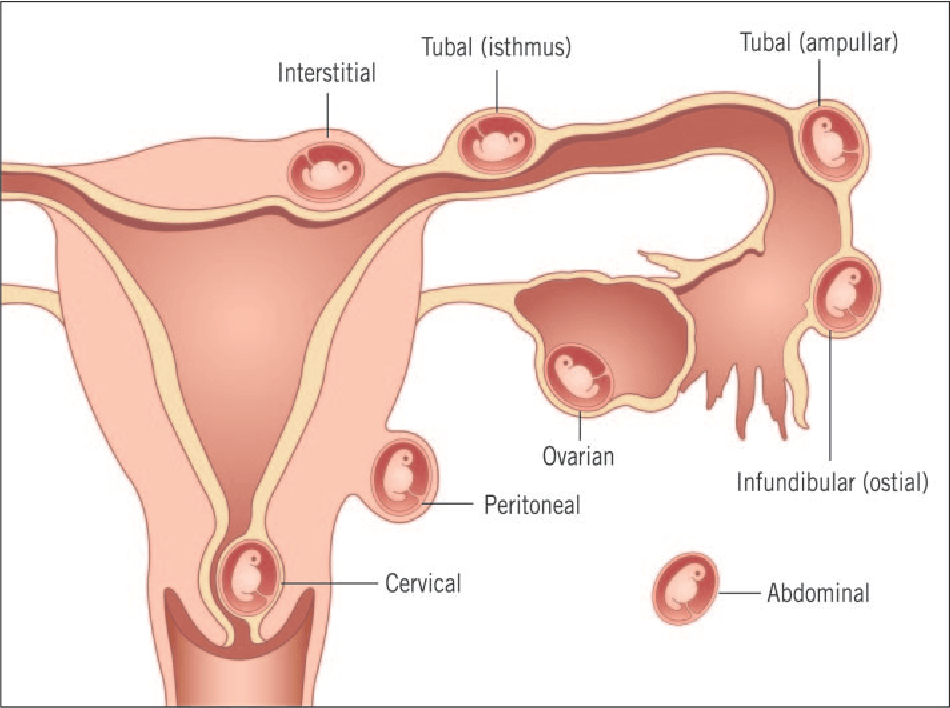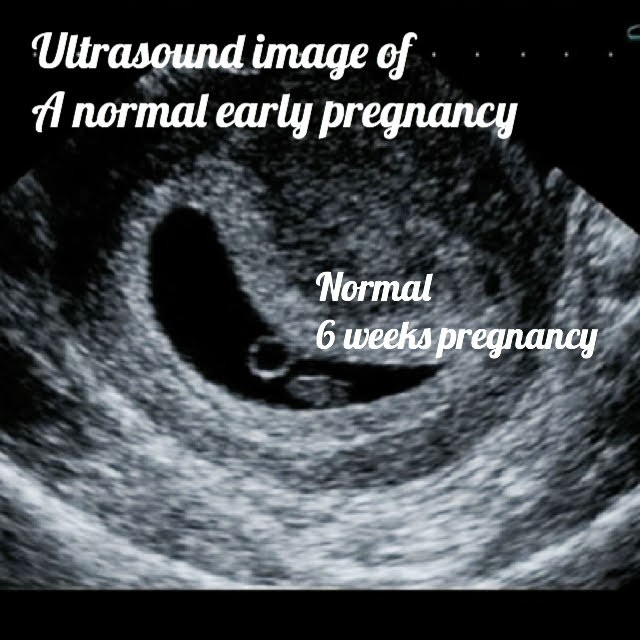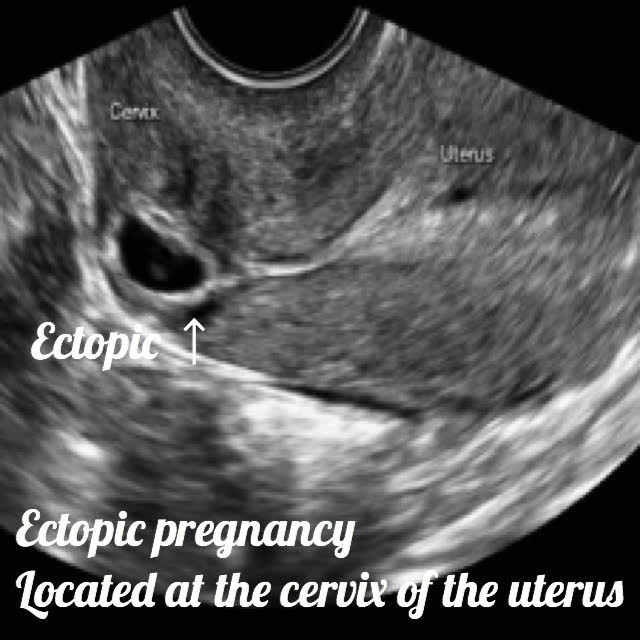An ectopic pregnancy can be a life-threatening condition if is not treated quick and properly. Some of the most recent statistics for ectopic pregnancy according to the March of dimes study, show that: 1 in 50 pregnancies in the United States result in ectopic pregnancy and in addition 7 to 15% of women who visit an emergency room with pain and abnormal bleeding in the first trimester of pregnancy is due to an ectopic pregnancy. In this post, you will find useful information about ectopic pregnancy. Causes, risks, early and late symptoms, diagnosis with ultrasound images, treatments, and finally recovery tips, ready? let’s begin…

What is Ectopic Pregnancy?
An ectopic pregnancy occurs when the fertilized egg implants outside the uterus and starts to develop. The word ectopic means “in an abnormal place or position.”
The most common site is the Fallopian tube. However, ectopic pregnancy can also occur in the ovary, the abdomen, and the cervical canal (the opening from the uterus to the vaginal canal).
Causes of ectopic pregnancies.
Sometimes the causes of ectopic pregnancy can be unclear. However one of the major causes is a damaged fallopian tube. This could prevent the fertilized egg from getting into your uterus.
Risks factors for Ectopic pregnancies.
- Being older than 35 years old.
- History of pelvic inflammatory disease (PID).
- Sexually transmitted diseases.
- Scarring from previous pelvic surgeries.
- History of ectopic pregnancy.
- Unsuccessful tubal ligation or tubal ligation reversal.
- Use of fertility drugs.
- Infertility treatments such as in vitro fertilization (IVF).
- Smoking: In smoker women, the risk of Ectopic pregnancies is 4 to 20 times higher compared to Non-smoker women.
- History of Fallopian tube birth defects.
- Getting pregnant after a tubal ligation.
Other conditions that can increase the risk of ectopic pregnancy as well:
Endometriosis: A condition in which the tissue normally found within the cavity of the uterus starts building up outside. This can cause Fallopian tube obstruction.
Exposure to diethylstilbestrol (DES): If a woman’s mother took DES (a synthetic version of the hormone estrogen) during pregnancy, the woman may have abnormalities in her Fallopian tubes which increase the risks for ectopic pregnancy.
Use of an intrauterine device (IUD): If a woman becomes pregnant while using an Intrauterine device for contraception, the risk for ectopic pregnancy is higher.
Symptoms of ectopic pregnancy.
In an ectopic pregnancy, all the hormonal changes associated with a normal pregnancy may occur.
The early symptoms include:
- Fatigue.
- Nausea.
- Missed period.
- Breast tenderness.
- Low back pain.
- Cramping on one side of the pelvis.
- Abnormal vaginal bleeding, usually spotting.
Later symptoms of ectopic pregnancy.
As the embryo grows large within the tube. The first sign may be a stabbing pain in the pelvis or abdomen.
If the tube has ruptured, blood may irritate the diaphragm and cause shoulder pain. Other warning signs are lightheaded and fainting.
Pin the post here!

Diagnosis of ectopic pregnancy.
If you have a positive pregnancy test at home, the protocol at the doctor’s office is as follow:
- Urine pregnancy test to confirm pregnancy.
- Do an HCG pregnancy test on blood to check hormone levels.
- A pelvic exam is done by the physician.
Ultrasound will be useful to determine pregnancy viability and location.
Lab tests can provide information for diagnosis. Measurement of the human chorionic gonadotropin (hCG) level in the patient’s blood serum is the most useful lab test in the early stages.
In a normal pregnancy, the level of this hormone doubles about every two days during the first 10 weeks. In an ectopic pregnancy, the rate of the increase is much slower. The low hCG for the stage of the pregnancy is a strong indication that the pregnancy is abnormal. (It could also represent a miscarriage in progress).
And secondly if you are 6 weeks or more pregnant, a viable gestational sac and fetus should be seen on Ultrasound, however, if you are earlier a follow up with HCG and Ultrasound will be ideal to Rule the ectopic pregnancy versus an early pregnancy vs a miscarriage.
Related posts:
Pregnancy Loss. How To Overcome The Pain.
How to maximize your chances of getting pregnant.
Ultrasound images of ectopic pregnancy.



Treatment of ectopic pregnancy.
Medical
If the ectopic pregnancy is discovered in a very early stage of development, the drug methotrexate is used. The best results are obtained when the pregnancy is less than six weeks old and the tubal mass is no more than 1.4 in (3.5 cm) in diameter.
Surgical
A laparoscopy is done to visualize the ectopic pregnancy. Surgical tools are used to remove the ectopic mass immediately. The affected Fallopian tube can be repaired or removed as necessary. This procedure can be done without the patient having to stay in the hospital overnight.
When the pregnancy has already ruptured, a surgical incision into the abdomen will be necessary, this is known as laparotomy. This procedure is performed to stop blood loss and to remove the ectopic pregnancy. This usually requires general anesthesia and a hospital stay. Every effort is made to preserve and repair the injured Fallopian tube. However, if the Fallopian tube has already ruptured, the repair is extremely difficult and the tube is usually removed.
Physical Recovery.
- For a laparoscopy, the average time a woman takes to recover is 2 to 3 weeks.
- Laparotomy the average time for recovery can be up to 6 weeks.
The patient can take prescription or over the counter drugs for the first few weeks so that she can manage the discomfort around the incision area.
Emotional Recovery.
This part of the recovery could be difficult and can take longer to heal. Keep the following tips into consideration:
- Talk to someone you can trust like your friend or any family member who would listen to your grievance and support you.
- Join support groups where women talk about their loss in a safe environment.
- You could also cheer yourself up to feel better by doing something for yourself like going to a spa or shopping.
- Do some physical activities like exercising as it could be an effective way to minimize your sadness and regain all the energy that you have lost.
Conclusion about Ectopic Pregnancy.
Having an ectopic pregnancy doesn’t mean you won’t be able to conceive later on. The percentage of women that have children after ectopic pregnancies is high. The proper treatment will ensure your success for future pregnancies.
I hope this information was helpful to you. If you like this post keep sharing to other mommies. Let’s keep changing the world, one mamma at a time! Stay tuned for more helpful posts like this one.
Zadi, xo
Disclaimer: Due to HIPPA regulations all patient information is protected on this site. The majority of the Ultrasound images are my own. The information provided on my blog is designed to provide helpful information about the topic. And this post is made with the best of my knowledge. Therefore, this post is not intended to diagnose or treat any medical condition. For diagnosis or treatments consult your own physician. The author is not responsible or liable for any mistreated pathologies.










[…] All you need to know about ectopic pregnancy. […]
[…] All you need to know about ectopic pregnancy. […]
[…] All you need to know about ectopic pregnancy. […]
F*ckin?tremendous issues here. I am very satisfied to look your article. Thank you a lot and i’m having a look forward to touch you. Will you kindly drop me a mail?
[…] All you need to know about ectopic pregnancy. […]
Hey I know this is off topic but I was wondering if you knew of any widgets I could add to my blog that automatically tweet my
newest twitter updates. I’ve been looking for a plug-in like this for quite
some time and was hoping maybe you would have some experience with something like
this. Please let me know if you run into anything.
I truly enjoy reading your blog and I look forward to your new updates.
Hello my friend! I wish to say that this post is amazing, nice written and include almost all vital infos.
I’d like to look extra posts like this .